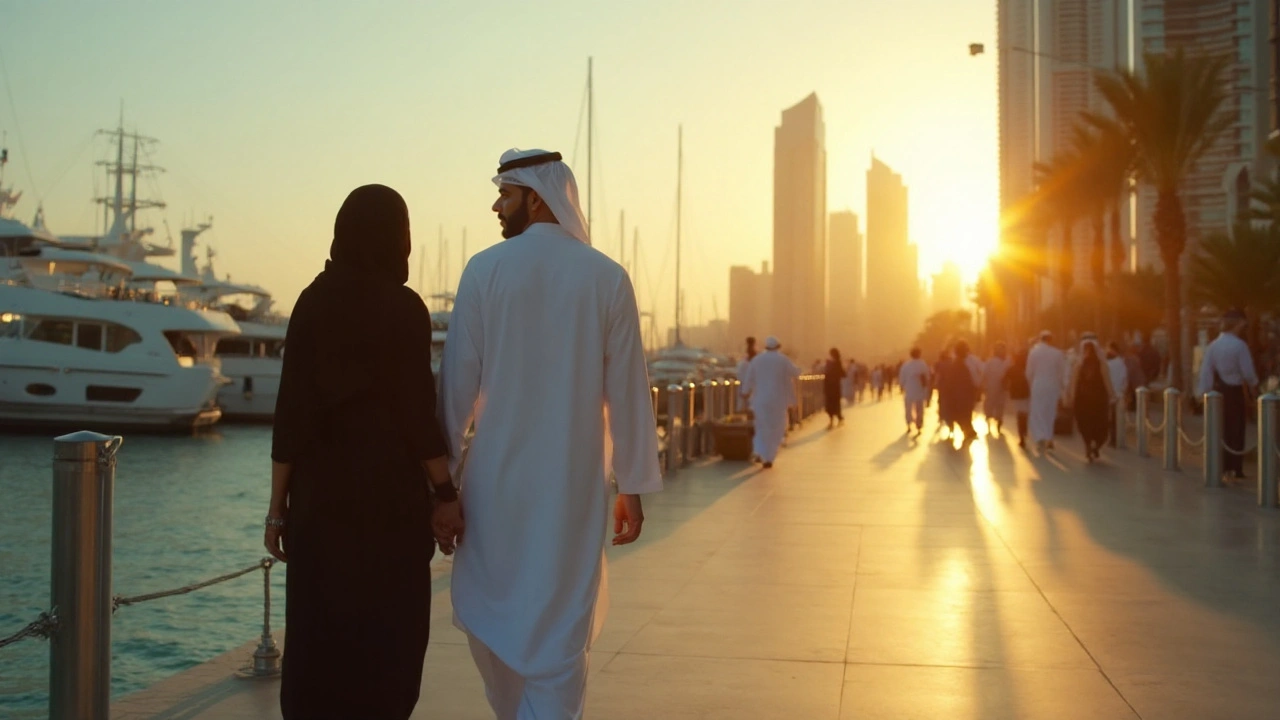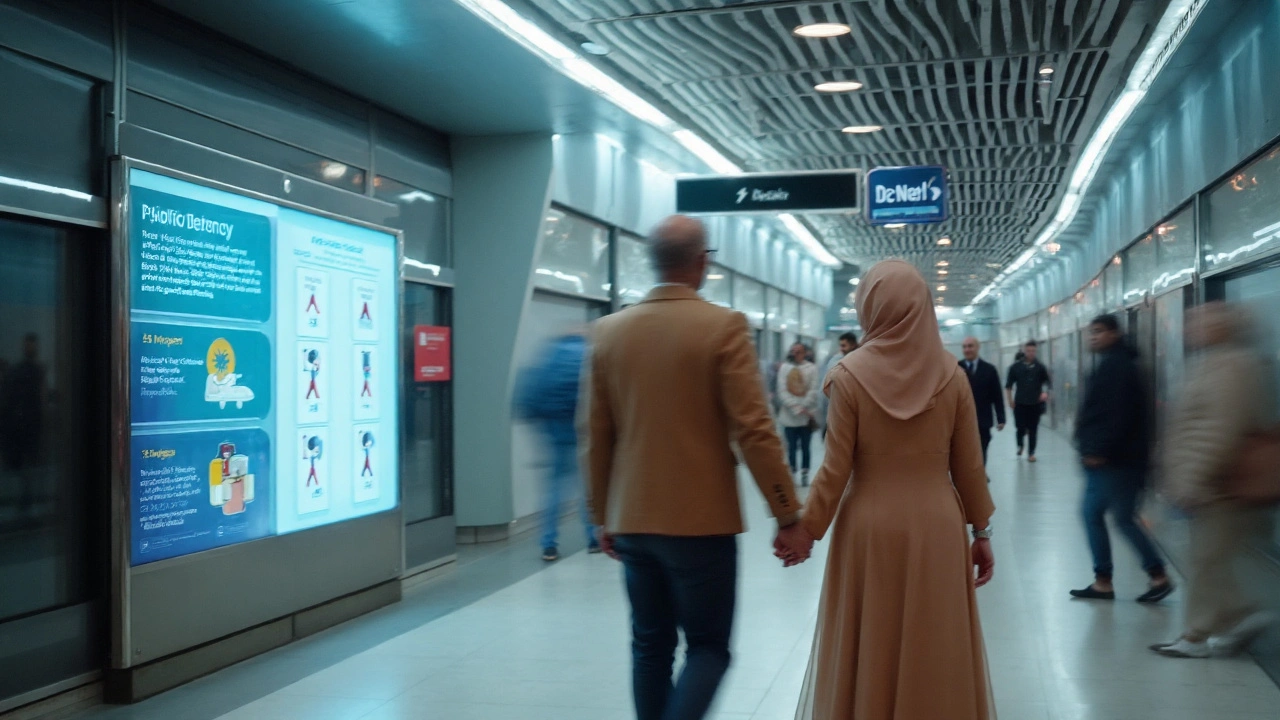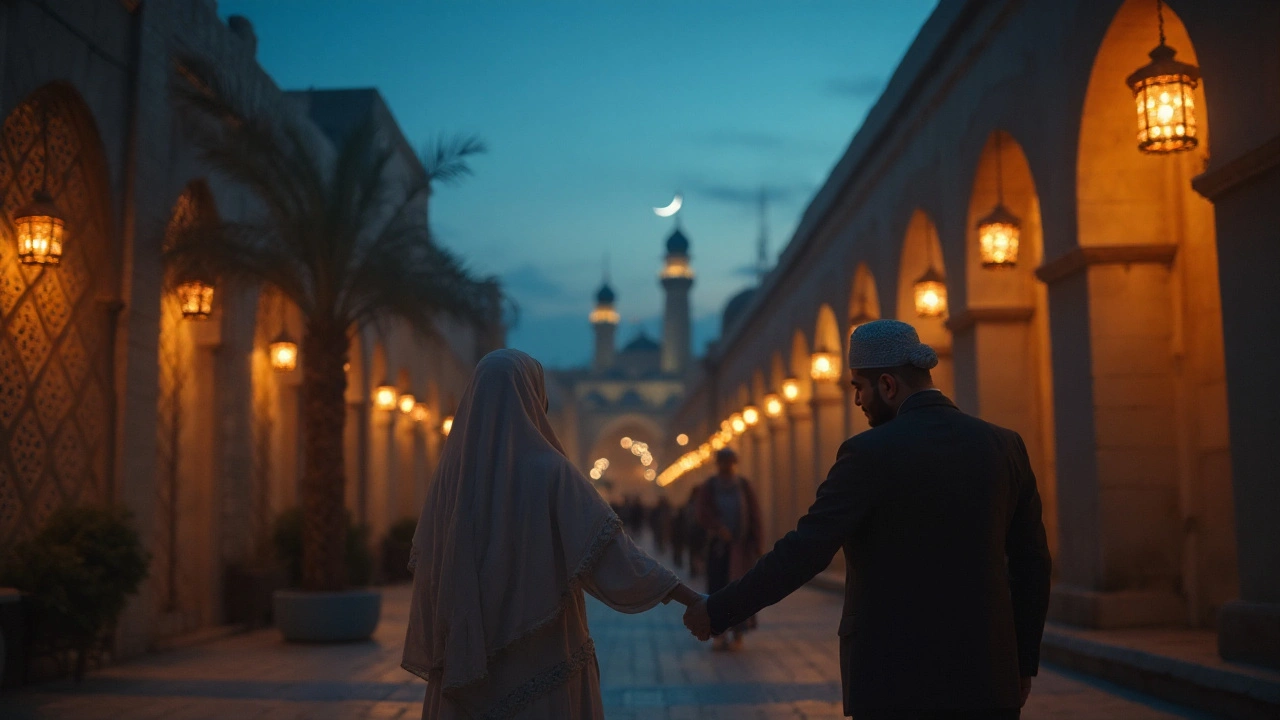
You clicked this because you want a straight answer: can you hold hands with your wife in Dubai without getting into trouble? Short answer-yes, it’s generally fine for married heterosexual couples to hold hands in Dubai. But the city still enforces modesty rules, and what feels normal at home can read as “too much” there, especially in family spaces, near mosques, and during Ramadan. If you want zero drama on holiday, it pays to know the line between sweet and risky.
TL;DR
- Married heterosexual couples can hold hands in Dubai in most public places; keep it light and respectful.
- Kissing, hugging for long periods, or sitting on each other’s lap in public can attract warnings from security or police.
- Same-sex intimacy in public (including hand-holding) can lead to serious legal issues; use extreme caution and choose private settings.
- Be extra modest during Ramadan, in or near mosques, government sites, and family areas.
- Carry a digital copy of your marriage certificate if you think you might need to prove it; comply politely if approached.
What’s legal, what’s social, and what actually happens
Dubai’s rules on public affection sit at the intersection of law, local culture, and on-the-ground enforcement. You’ll see plenty of couples walking hand-in-hand at Dubai Mall, in Marina, and on hotel promenades. You’ll also see security step in if things get too intimate. The challenge is the grey zone: what’s “sweet” to you can look “indecent” under local standards of public morality.
Here’s the legal backbone in plain language. The UAE’s Crimes and Penalties Law (Federal Decree-Law No. 31 of 2021) includes provisions around acts that offend public morals. It doesn’t list every single behavior-like “holding hands”-but it gives authorities room to act on public indecency. Dubai also has a Code of Conduct (issued by the Dubai Executive Council) that encourages modest behavior in public; it’s been repeatedly referenced by officials and in local awareness campaigns. Dubai Police and government communications have long framed it this way: mild affection between married couples may be accepted, but kissing and prolonged physical intimacy are not.
So, where does that leave you? If you’re a heterosexual married couple, discreet hand-holding is widely tolerated. If anyone raises an eyebrow, it’s usually for kissing on the lips, long hugs, or overt touching. If you’re unmarried, you’ll still see plenty of couples holding hands without issues-Dubai has softened in many ways since the 2000s-but you’re technically safest when you can prove you’re married. And if you’re in a same-sex marriage, remember the UAE doesn’t recognize it, and same-sex intimacy in public is risky.
I’m a woman living in Edinburgh who travels to the UAE for work and family stopovers. My last visit to Dubai was in May 2025. I saw plenty of hand-holding in spots like Bluewaters, City Walk, and The Beach at JBR-completely uneventful. Where I noticed more caution (and more security presence) was around mosques, in Old Dubai, on the Metro during busy times, and in government districts. The vibe shifts by area and time of day.
| Scenario | Observed risk level | Recommended behavior | Notes (2023-2025 advisories & reports) |
|---|---|---|---|
| Walking in a mall (e.g., Dubai Mall) | Low for married heterosexual couples | Brief hand-holding is fine; avoid kissing | Security may caution for kissing; hand-holding rarely draws attention |
| Beach promenades (JBR, La Mer, Kite Beach) | Low to medium | Hand-holding OK; keep it subtle near families | Family areas are more conservative; swimwear rules also apply |
| Near mosques or during prayer times | Medium to high | No physical affection; step back and be respectful | Modesty expectations rise around religious sites |
| Old Dubai (Deira, Bur Dubai souks) | Medium | Keep hands free; focus on shopping and photos | More traditional crowds; tighter spaces; watch tone and touch |
| Metro, trams, buses during peak hours | Medium | Avoid PDA; keep to your side, mind the crowd | Public transport is high-scrutiny; signs remind of conduct standards |
| Hotel lobbies, resort grounds | Low | Light hand-holding fine; no kissing | Tourist-heavy spaces are more relaxed but not a free-for-all |
| Ramadan (citywide) | Medium to high | Avoid public affection entirely | Modesty is expected; eating/drinking in public is restricted daytime |
| Same-sex couples anywhere | High | No PDA in public; keep intimacy private | UAE does not recognize same-sex marriage; public intimacy can lead to serious issues |
Authoritative references worth knowing: the UAE’s Crimes and Penalties Law (Federal Decree-Law No. 31 of 2021) on public morality; Dubai’s Code of Conduct on acceptable behavior in public; and travel advisories from the UK FCDO and the US State Department that consistently tell visitors to avoid public displays of affection. These aren’t hidden rules; they’re public-facing guidelines that match how the city enforces standards day-to-day.

How to show affection safely: when, where, and how (with examples)
If you like to walk linked together, you can. The trick is to read the room. Dubai is cosmopolitan, but it’s still a place where modesty is the default. Use these simple rules of thumb to stay comfortable.
- The “grandma test”: Would you behave the same if your partner’s grandmother was right next to you? If yes, you’re likely fine.
- The “five-second rule”: If you do touch, keep it brief-no lingering hugs or kisses.
- The “family radar”: If you’re in a space with lots of prams, kids, or school groups, keep affection hands-off.
- The “signs check”: On transport, in parks, and near attractions, look for conduct signs. When in doubt, err on the quiet side.
- During Ramadan: Treat public affection as off-limits, even if you’re in a tourist zone.
Let’s walk through common situations.
-
Malls and indoor attractions. Shopping is a national sport in Dubai, and malls feel like cities. If you’re married, light hand-holding is fine as you move from shop to shop. If you stop to watch a fountain show or take a selfie, drop hands and stand side-by-side. Security responds the moment kisses start-especially lip-to-lip or anything prolonged.
-
Promenades and beaches. Strolls at The Walk (JBR), Bluewaters, or along Kite Beach can be romantic. Keep it minimal when families cluster or when evening prayers echo. On the sand, you’ll see couples side-by-side on towels; try to avoid cuddling postures that look like hugging in public.
-
Restaurants and rooftop lounges. At a table, grasping hands across the table for a quick second draws no attention. Sitting on laps, necking, or draped cuddles will. Many places are attached to hotels and are used to tourists-but the rule stays modest.
-
Cultural sites and Old Dubai. In Al Fahidi, Creekside souks, and around mosques, show affection with your eyes and smile. Keep a respectful distance and focus on the setting. You’re there for history; let it have the spotlight.
-
Transport. On the Metro and trams, space is shared and monitored. Stand close without touching. If you need to steady one another, use a light touch to an arm or bag, then let go.
A quick word about proof of marriage. You probably won’t be asked, but if you’re worried, keep a clean photo of your marriage certificate on your phone. If questioned (rare, but it happens when someone complains), it can defuse the moment. The city’s frontline approach is usually: a polite warning, a request to stop, and move along. Respond kindly, and it ends there.
What about photos? It’s fine to take a cute couple shot. Go for a shoulder-to-shoulder pose, a forehead-to-temple lean, or fingers intertwined at waist level. Skip the kiss or embrace in frame. If a photographer at a landmark cues you, they’ll keep it safe by default.
And the big one many couples ask: Is it okay to hold hands in Dubai? Yes-for a married heterosexual couple, yes. That’s the common, comfortable baseline in 2025, reinforced by real-world practice and the city’s own messaging on modesty.
Now, a delicate but crucial note for LGBTQ travelers. I’m not here to sugarcoat. The UAE does not recognize same-sex marriage, and public intimacy between same-sex partners can lead to detention, fines, or worse. Some hotels run by international brands will quietly offer a safe, discreet experience in private spaces, and many LGBTQ travelers do visit without incident. The safest plan is to present as friends in public, save affection for private hotel rooms, and route social time through hotel lounges where you can relax without drawing attention. If that doesn’t feel right, consider alternative hubs in the region where legal frameworks match your relationship.
Timing matters. During Ramadan, even straight couples who are married should avoid public displays of affection entirely. That includes hand-holding on promenades, and it certainly rules out kissing in public. Think of it as a short, respectful pause, then resume your usual low-key affection after Eid.
Wardrobe and body language also set the tone. If you’re both dressed modestly, you’ll attract less scrutiny. For women, a summer dress to the knee or longer, shoulders covered in conservative pockets of the city; for men, trousers or long shorts just above the knee and a tee or polo. This isn’t about shame; it’s about blending in so your affection looks like care, not a spectacle.

Checklists, safeguards, and a simple decision guide
If you prefer structure, here’s a practical system to keep you confident wherever you are in Dubai.
Quick checklist before you head out:
- Do we plan to visit religious or government areas today? If yes, no PDA.
- Is it Ramadan? If yes, keep affection private and subtle, or skip it entirely.
- Are we heading to a family-heavy area (parks, playgrounds, kids’ festivals)? Keep hands free.
- Are we staying in or passing through a resort or hotel lounge? Brief hand-holding is fine.
- Do we know the nearest clean, private spot (hotel room, private cabana) to reconnect later? That helps curb the urge to kiss now.
Decision guide for couples:
-
Look around-families and signage? If yes, skip PDA. If no, light hand-holding is okay if you’re married (heterosexual).
-
Are you stopping or standing still for a while? Drop hands. Movement reads as casual; lingering reads as intimate.
-
Is someone watching closely or frowning? Take the hint, separate kindly, and smile. You’ll avoid a complaint.
-
Did security approach you? Apologize, comply, and continue your day. Don’t argue cultural points in public.
What to carry (discreetly):
- Digital marriage certificate (scan or photo) stored offline on your phone.
- Travel insurance details and your embassy’s emergency number.
- A simple, respectful script: “We’re sorry. We understand. It won’t happen again.”
Pitfalls to avoid:
- Kissing in public, even quick pecks.
- Lap-sitting, hugging for photos, or hands on hips/waist while stationary.
- Playful PDA after drinks when inhibitions drop.
- Assuming a tourist cluster means anything goes; staff still enforce rules.
Good-to-know subtlety: enforcement often starts with other people. If someone complains-maybe a nearby family, maybe a passerby-security must respond. That’s why it’s entirely possible to see one couple stroll by hand-in-hand with no problem while another couple gets warned for a quick kiss. Different behaviors, different neighbors, different outcomes. The safest way to navigate that randomness is to keep affection at a low simmer in public, save the rest for when you’re alone.
Where “low-key” thrives:
- Waterfront walks at off-peak times (mornings, weekdays before sunset)
- Hotel grounds and lounges with mixed tourist crowds
- Casual outdoor markets and food halls after the dinner rush
Where it doesn’t:
- Outside mosques, especially during prayer call
- Old Dubai’s souks at busy hours
- Public transport platforms and inside train carriages
- Ramadan daytimes anywhere public
A quick note on kids and families. If you’re pushing a pram or wrangling toddlers, a hand to the elbow, a palm to the shoulder, or a peck on the top of a child’s head is normal parental contact and not viewed as PDA. The line is romantic affection between adults. Keep family soothing gestures separate from couple affection in public spaces.
If you want romance without worry, book it. Private dining setups at beach resorts, cabanas with curtains at luxury hotels, and in-room dining with a skyline view are designed for intimacy. Dubai quietly excels at romance in private settings-hotels know the line better than anyone and will help you stay within it.
What about Abu Dhabi or Sharjah day trips? Abu Dhabi is similar to Dubai: modern, but modest. Sharjah is stricter culturally. Apply the same rules with an extra notch of caution in Sharjah-no PDA, even hand-holding. If you’re not sure which emirate you’re in on a tour, assume stricter rules until you confirm.
Why do travel advisories still sound stern even though you see couples holding hands? Because they’re written to cover worst-case scenarios, not the median experience. The UK FCDO and US State Department have to write for the unlucky day when a complaint escalates. Your goal is to never be that case file. Keep it modest, and you’ll blend into the big, happy mix of visitors who come and go without a blip.
Mini‑FAQ
- Can an unmarried straight couple hold hands in Dubai? You’ll see it all the time. It’s commonly tolerated, but it’s safer when you’re married. Either way, avoid kissing.
- Can same-sex couples hold hands in Dubai? Don’t. The legal risk is real. Keep affection private and low-profile in public spaces.
- What happens if security speaks to us? They’ll usually ask you to stop the behavior and move on. Apologize and comply. It rarely goes beyond that unless there’s argument or repeated conduct.
- Is it different during Ramadan? Yes. Expectations of modesty increase. Avoid public affection entirely, even hand-holding.
- Do we need to carry a marriage certificate? Not required, but a digital copy can be handy if questioned.
- Are private hotel rooms safe for affection? Yes. Private spaces are where you enjoy affection without scrutiny. Keep doors closed and noise down to avoid complaints.
Credible references you can look up by name: UAE Federal Decree-Law No. 31 of 2021 (Crimes and Penalties), Dubai Code of Conduct (Dubai Executive Council), Dubai Police public guidance on public decency, UK FCDO and US State Department travel advice for the UAE (public displays of affection). These have remained consistent through 2025: keep affection modest in public, save intimacy for private spaces.
Next steps and troubleshooting for different scenarios
- Married heterosexual couple, first time in Dubai: Enjoy hand-holding on promenades and in malls. Skip kissing. During Ramadan, hold off on PDA. If in doubt, ask hotel staff for cultural tips before you head out.
- Unmarried couple: Keep it even lighter. Walk side-by-side, arms brushing, hands lightly linked while moving. Break contact when stopping at crossings or queues.
- Same-sex couple: Present as friends in public. Choose international-brand hotels with strong privacy norms. Use private dining, in-room spa, and private cabanas to celebrate your relationship.
- Families with kids: Show affection to children without worry; keep romantic gestures between adults for private spaces. You’ll be fine.
- Expats hosting visiting relatives: Brief your guests. “Hand-holding is OK, kissing no. Extra modesty near mosques and during Ramadan.” It saves you from awkward moments.
If something goes wrong-like a complaint is made and you’re stopped:
- Pause and listen. Don’t interrupt.
- Apologize: “We understand. We’ll stop.”
- Show ID if asked. If requested, show your digital marriage certificate.
- Do not argue cultural points. Keep voices low and calm.
- If it escalates, ask to contact your embassy and your hotel’s duty manager. Call your travel insurer’s assistance line.
One last mind shift that helps: think “affection as background noise.” Walk together, chat, laugh, share food, take photos. Let your closeness show in eye contact and ease. Keep your hands ready to reassume that light link when you’re moving-and ready to separate the moment the setting turns formal. You’ll feel respectful and still feel like yourselves. That’s the sweet spot in Dubai.
Dubai Escort